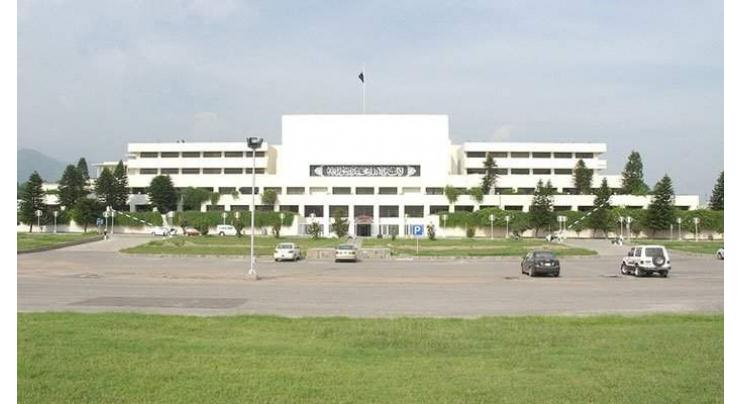
- Home
- Pakistan
- News
- Senate passes three bills including 'Islamabad Rent Restriction (Amendment) Bill-2021'
Senate Passes Three Bills Including 'Islamabad Rent Restriction (Amendment) Bill-2021'
Faizan Hashmi Published December 27, 2021 | 08:30 PM

The Senate of Pakistan on Monday passed three bills including the Islamabad Rent Restriction (Amendment) Bill, 2021 aimed at resolving the issues that usually emerge after expiry of agreement between landlord and tenant, without undue delay
ISLAMABAD, (UrduPoint / Pakistan Point News - 27th Dec, 2021 ) :The Senate of Pakistan on Monday passed three bills including the Islamabad Rent Restriction (Amendment) Bill, 2021 aimed at resolving the issues that usually emerge after expiry of agreement between landlord and tenant, without undue delay.
The Islamabad Rent Restriction (Amendment) Bill, 2021, introduced by Senator Mohsin Aziz, was unanimously passed after clause-by-clause reading by Chairman Muhammad Sadiq Sanjrani.
Mohsin Aziz said the amendment would help resolve the issue of prolonged litigation due to some flaws in the certain tenancy laws, and provide relief to the petitioners at the earliest.
"This bill will be useful in early evacuation of any rented premises and put it on next lease after expiry of the tenancy agreement," he said.
The House also approved the bill to amend the Trade Organizations Act, 2013 (The Trade (Amendment) Bill, 2021 that was moved by Senator Fawzia unanimously.
The Senate passed another bill titled "The Code of Criminal Procedure (Amendment) Bill, 2021, amending the Code of Criminal Procedure, 1898. It was moved by Senator Shahadat Awan.
Meanwhile, the House held a thorough debate on a bill meant to amend the Pakistan Penal Code, 1860 and the Code of Criminal Procedure, 1898 (the Criminal Laws (Amendment) Bill, 2021), and referred to the Council of Islamic Ideology for its views.
The amendment in the bill described that 'attempt to suicide' was a 'sickness' and not the 'crime,' suggesting proper treatment of the person, attempting suicide, instead of giving punishment.
Minister of State for Parliamentary Affairs Ali Muhammad Khan was of the view that committing suicide was 'forbidden' in islam, and due to sensitivity of the issue the proposed amendment needed further 'in-depth evaluation.' Leader of the House Dr Shahzad Waseem said the proposed amendment equated the act of suicide with the mental health's disorder and suggested no punishment for the person attempting to take his/her life.
"There are a lot of ifs and buts, so its thorough evaluation is needed by scientific and religious aspects," he said, asking to take the point of view of ulema, religious scholars and scientific experts.
Later, Senator Faisal Javed requested the House to withdraw the Bill further to amend the Federal Public Service Commission Ordinance, 1997 (The Federal Public Service Commission (Amendment) Bill, 2020.
He informed the House the relevant authorities had assured the Standing Committee concerned that the FPSC rules would be changed as per the spirit of the proposed amendment, so there was no need for the amendment in the bill.
He said the amendment was aimed at evaluating jobs in the FPSC and ensuring merit, and the authorities concerned had assured to bring the required procedural changes in the relevant rules.
In due course of time, Faisal Javed, he would bring a 'comprehensive bill' mainly to ensure merit in the FPSC jobs.
The House also referred a bill, moved by Senators Seemee Ezdi, Khalida Ateeb and Mushahid Hussain Sayed that was meant for the establishment of Pakistan Psychological Council (The Pakistan Psychological Council Bill, 2021), to the Standing Committee concerned for further deliberation.
Earlier, three bills including to amend the Banking Companies Ordinance, 1962 (The Banking Companies (Amendment) Bill, 2021), amendment in the Registration Act, 1908 (The Registration (Amendment) Bill, 2021), and amendment in the Control of Narcotic Substances Act, 1997 (The Control of Narcotic Substances (Amendment) Bill, 2021, were introduced and referred to the standing committees concerned for evaluation of debate.
Related Topics
Recent Stories

Charles & Catherine's cancer diagnoses

Woman stabbed in Israel, attacker killed: police

Finance minister reviews progress on FBR digitalization

US stocks rebound on tech earnings, London hits new record

At least 10 people killed in Brazil fire: officials

Shahzaib Rind calls on Deputy Speaker Balochistan

Ahsan chairs 13th CPEC-JCC preparatory meeting, reviews arrangements for high-le ..

DC Tharparkar inaugurates anti-polio campaign

HDA Mehran workers demand salaries

Taxila police nab motorcycle lifter gang

Inter-university weightlifting championship kicks off at SAU

Walk held in a series of enrollment campaigns
More Stories From Pakistan
-

DC Tharparkar inaugurates anti-polio campaign
1 hour ago -

HDA Mehran workers demand salaries
2 hours ago -

Taxila police nab motorcycle lifter gang
1 hour ago -

Walk held in a series of enrollment campaigns
2 hours ago -

Kids murders: IHC orders psychiatric examination of mother
2 hours ago -

Health minister credits PML-N for advancements in organ transplantation
1 hour ago
-

Court grants interim bail to Azam Swati in cyber crime case
1 hour ago -

Commissioner chairs meeting of divisional task force for polio
1 hour ago -

Abuser boy arrested in Taxila
1 hour ago -

Drugs peddler gets 9 years imprisonment
1 hour ago -

03 youngsters killed after tractor trolley runs over motorcycle
1 hour ago -

Climate change poses severe threats to Pakistan, Balochistan: Samina Zehri
1 hour ago











